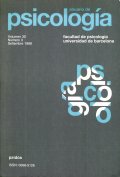Influencia de los modelos intuitivos en la comprensión de la multiplicación y la división
Paraules clau:
Intuitive models, multiplication, division, problem solving, problem posing.Resum
Since the stdy by Fischbein et al. (1985) which suggested that children develop intuitive models about multiplication and division early, much research has offered data that corroborate these models. In this study we analyze the differential weight of the models in three kid of task: algorithms, problem solving, and problem posing. We included two age groups (1st of ESO and 8th of EGB), and three kid of quantities (whole numbers, decimals and fractions). The results indicated that the intuitive models did not have the same differential weight for the different tasks. For instance, the problem posing task did not seem suited to the conditions under which the intuitive models act. Likewise, the presence of quantities that failed to observe one or more restrictions of the models did not have a negative influence. In contrast, the errors committed in the two remaining tasks were almost exclusively due to the application of the intuitive rules.Descàrregues
Publicades
1999-01-13
Número
Secció
Articles
Llicència
El/la autor/a que publica en esta revista está de acuerdo con los términos siguientes:
El/la autor/a cede en exclusiva todos los derechos de propiedad intelectual al/la editor/a para todo el mundo y toda la duración de los derechos de propiedad intelectual vigentes aplicables.
El/la autor/a puede difundir una copia de sus artículos respetando la política de acceso libre de la revista.


